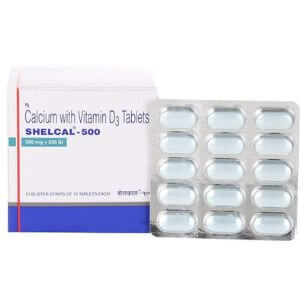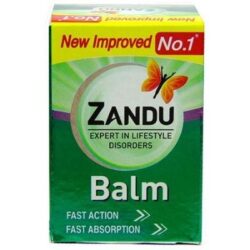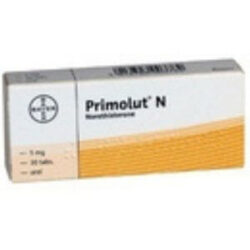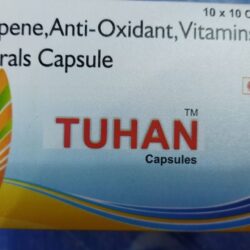Description
Information about Shelcal 500 Tablet
It contains calcium as well as Vitamin D3. Calcium is also essential for heart, muscle, and nerve functions and also aids in the clotting of blood. This mineral also helps to treat and manage osteoporosis and to prevent calcium deficiency in pregnant and breastfeeding women. The primary function of Vitamin D3 in the body is to maintain healthy and strong bones. It does so by ensuring calcium absorption in the gut and by maintaining adequate levels of two minerals essential for bone health, calcium, and phosphorus.
Key ingredients:
- Calcium: 500 mg
- Vitamin D3 (cholecalciferol): 250 IU
Key benefits/uses of Shelcal 500 Tablet:
1. To treat calcium deficiency due to:
- Inadequate dietary intake
- Hypoparathyroidism (reduced production of parathyroid hormones which regulate the levels of calcium and phosphorous in the body)
- Kidney failure
- Pancreatitis (Inflammation of the pancreas)
- Certain medicines such as corticosteroids, anticonvulsants, and rifampicin
- Liver disease, causing low albumin levels which might affect calcium levels
2. To treat Vitamin D3 deficiency due to:
- Decreased function of the kidneys
- Inadequate absorption of Vitamin D3 by the digestive tract (due to conditions like Crohn’s disease, celiac disease, and cystic fibrosis)
3. To increase the levels of Vitamin D3 in the milk of breastfeeding women. Vitamin D3 requirements of breastfed infants cannot be met by human milk alone. Hence, mothers are advised for supplementation of Vitamin D3.
4. To increase Vitamin D3 levels in elderly people because due to age and a long time spent indoors, their skin fails to synthesize Vitamin D3 efficiently.
5. To improve levels of Vitamin D3 in people with fat malabsorption whose intestine fails to absorb fat from the diet, thereby reducing the absorption of Vitamin D3 which needs dietary fat to get used by the body.
Direction for use:
Take Shelcal 500 as directed by your physician. In general, it is best to take it after meals, as the source of calcium in Shelcal 500 is calcium carbonate, which is absorbed well in the presence of food.
Quick tips for Shelcal 500 Tablet:
- If you think that your diet fails to meet the daily dose of calcium, consult your doctor before you decide on taking supplements.
- Do not take iron and calcium supplements together, as the absorption of calcium may get hindered.
- It is not advised in people suffering from tissue calcification, malabsorption, kidney problems or blood cancer.
- To avoid overdosing on these supplements, inform your doctor if you are taking any other product containing Vitamin D or calcium along with Shelcal 500 tablets.
- Do not take these supplements if you are allergic to Vitamin D, calcium or any other ingredients present in this medicine.
- In case you miss a dose, take it as soon as you remember. However, if it’s almost time for the next dose, skip the dose you missed and take your next dose at the scheduled time.
Side-effects of Shelcal 500 Tablet:
Some of the common side-effects of this tablet include:
- Constipation
- Vomiting & nausea
- Loss of appetite
- Feeling thirsty
- Bone pain
- Stomach pain
- Frequent urination
- Muscle weakness
- High level of calcium in urine
Storage and safety information:
- Read the label carefully before use.
- Do not exceed the recommended dose.
- Keep out of the reach and sight of children.
- Use under medical supervision.
- Do not take too much of this medicine as this may lead to overdose.
Why Do You Need Calcium & Vitamin D Supplements?
Your body cannot produce calcium on its own, so you have to rely on diet and supplements to meet your calcium needs. A lack of calcium could lead to a condition called rickets in children and osteomalacia or osteoporosis in later life. The symptoms of calcium deficiency include:
- Weak nails that break easily
- Dry and rough hair
- Dry and scaly skin
- Muscle cramps
- Forgetfulness (in severe cases)
- Confusion (in severe cases)
- Feeling sad (in severe cases)
- Hallucinations (seeing, hearing, smelling, or feeling things that don’t exist)
Vitamin D is a fat-soluble vitamin that is naturally present in very few foods but is available as a dietary supplement. Vitamin D supplements are available in two forms: Vitamin D2 (“ergocalciferol” or pre-vitamin D) and Vitamin D3 (“cholecalciferol”). While Vitamin D2 is produced in plants and fungi, Vitamin D3 is produced in animals, including humans. Vitamin D3 deficiency is said to be associated with:
- Difficulty in making decisions in old age
- Increased chances of severe asthma in children
- Increased risk of death from heart diseases and cancers
- Increased risk of osteoporosis (weak and brittle bones)
- Increased risk of osteomalacia (softening of the bones)
- Increases risk of rickets (a condition in which the mineralization of the bone tissue does not occur properly which can lead to bone softening and occurrence of bone deformities)
How Much Calcium & Vitamin D Do You Need?
Calcium: According to the Indian Council of Medical Research (ICMR) guidelines, the RDA of calcium depends on the age. The recommended dietary allowance (RDA) for Indians is as follows:
- Infants (0-1 years): 500 mg
- Children (1-9 years): 600 mg
- Tweens and Teens (10 – 18 years): 800 mg
- Adults: 600 mg
- Pregnant and lactating women: 1200 mg
Vitamin D: The Indian Council of Medical Research (ICMR) recommends a daily supplement of 400 IU/day of Vitamin D3 for Indians with emphasis on outdoor activities to achieve adequate Vitamin D.
If you are not meeting your daily requirement of Vitamin D3 or are suffering from Vitamin D3 deficiency, your calcium absorption may get affected. This is why supplements that contain calcium along with Vitamin D3, such as Shelcal 500 Tablet, are preferred.
FAQs related to Shelcal 500 Tablet:
Q. Is Shelcal 500 good for health?
When your body has calcium deficiency, it fulfills that need by using the calcium present in your bones, thereby weakening them. It prevents this weakening of bones by supplementing your body with the amount of calcium it needs to keep the bones strong.
Q. What is the difference between Shelcal 500 and Shelcal HD?
Shelcal 500 Tablet, as the name suggests, contains calcium (500 mg) along with Vitamin D3 (250 IU), whereas Shelcal HD contains calcium (500 mg) and Vitamin D3 (500 IU). As you can see, while the calcium level is the same in both the tablets, the only difference is in their concentration of Vitamin D3.
Q. Why do you need calcium?
We all know that calcium plays a key role in maintaining strong bones and building strong teeth. This essential mineral also facilitates nerve signal transmission, helps in blood clotting, and aids in the contraction and relaxation of muscles.
Since most of the calcium you obtain from your diet gets stored in bones and teeth, lack of this mineral can impair your bone health and up the risk of osteoporosis. This is the reason, you need to fulfill your daily needs of calcium to keep your bones healthy and to stay healthy.
Q. What to do if you have low calcium levels?
Based on your calcium blood test reports, your doctor may advise changes in your diet. For example, if your report shows low calcium levels, you might be asked to increase your intake of foods rich in calcium.
Dietary sources include dairy products such as milk, yogurt, and cheese, and foods that have added calcium like breakfast cereals, soymilk, bread, and bottled water. In cases of severe calcium deficiency, calcium supplements might be prescribed. Remember that calcium supplements should always be taken as per your doctor’s advice.
Q. Which foods are good sources of Vitamin D?
Foods that contain Vitamin D3 include fish such as tuna and salmon, cereals, orange juice, soy milk, dairy products, cheese, egg yolks, and beef liver. The other common dietary sources include natural food sources like cod liver oil, mushrooms as well as Vitamin D3 fortified foods.
Q. Why should one take Vitamin D supplements?
Sunlight is the major source of Vitamin D3. Most people think that Indians have sufficient levels of this vitamin due to adequate sunshine all around the year. But owing to increased skin pigmentation and suntan, people apply sunscreen and cover their body with full layers of clothing which limits the exposure to UV rays, reducing the synthesis of Vitamin D3 in the body.
Also, the availability of Vitamin D3 through diet is not widespread. Due to the lack of adequate sun exposure, deficient intake of foods rich in Vitamin D3, and lack of food fortification, Indians are susceptible to Vitamin D3 deficiency. This is why one needs to take Vitamin D supplements.
Q. Can excess calcium be harmful?
Dietary calcium is usually safe as it is unlikely to get amounts above the upper limits from food alone. If you take calcium supplements and eat calcium-rich/fortified foods, you may be getting more calcium than you realize; and more isn’t necessarily better. Excess calcium can cause bloating, constipation, and an increased risk of heart disease, kidney stones, as well as prostate cancer.
Q. Should I take a Shelcal 500 Tablet with or without food?
As Vitamin D3 is fat-soluble, it has to be taken with fatty foods. Many people take it with milk. It is easiest to take Vitamin D3 with a meal, but you can also pair it with a fat like fish oil or a teaspoon of coconut oil. Also, Shelcal 500 Tablet contains calcium carbonate which needs to be taken with food as it requires stomach acid for absorption.






Reviews
There are no reviews yet.